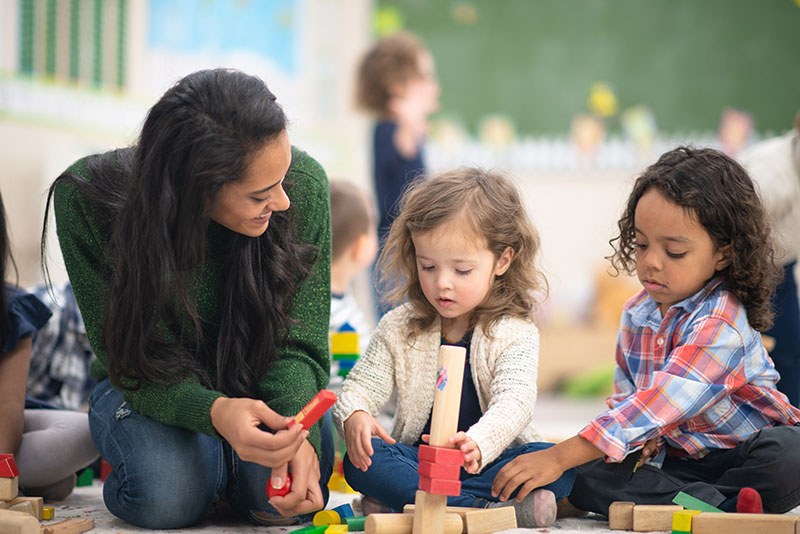Posted: January 22, 2020
Building warm, trusting relationships with the children in your care is one of the most important things you can do as an educator. Research shows that close relationships formed in early childhood can positively impact children’s academic and social-emotional skills while conflictual relationships can have a detrimental impact on the child’s well-being and development. Additionally, educators who feel they have positive relationships with the children in their care tend to see their jobs as more rewarding and feel better about themselves. So, what can you do to foster these positive relationships?

Here are some tips to help you build closeness and minimize conflict in your classroom
Start with hello.
It is important that all children feel welcome in your classroom. Providing a warm greeting at the start of the day can go a long way in communicating that you are glad to see them and that they are entering a safe environment where they will be taken care of. Remember that while some children may appreciate a loud and excited greeting, others may be more comfortable with eye contact and a soft greeting that just lets them know that you are happy they came to school. Try to match your greeting to the child, or even let the child pick how they would like to be greeted. It may be a high-five, a handshake, a hug, or even just a smile.
Take time to check in.
Find time to ask children how they're feeling, especially when something seems off. They may need help naming the emotion they're experiencing. Asking prompting questions like "Are you feeling embarrassed?" or "You seem frustrated, is that how you're feeling?" can help children communicate their needs and regulate their emotions. This also conveys that you care about the child. If a child is dealing with an uncomfortable emotion, help them to cope with their feelings in a healthy way. For example, encouraging children to take ten slow deep breaths can help them calm down in stressful situations. And remember that children in your care will learn from your actions. If you name emotions and practice healthy coping skills, they will likely adopt these behaviors as well!
Avoid coercive and punitive interactions.
Coercive patterns occur when an adult responds in a way that reinforces an undesirable behavior by a child. For example, if a child is frustrated and acts out and you respond in a harsh manner, this may result in the child feeling more frustrated and acting out again. Similarly, a child may refuse to do what they're asked to get attention from you. Ignoring this initial defiance and then providing positive encouragement after the child complies is a much more effective way of dealing with this behavior than escalating the situation. Responding with punishment, like sending a child to time-out, may seem to be effective in the short-term, but children do not learn new behaviors through punishment and this often leads to additional challenging behaviors. Instead, try something like a "time-in" where you sit with the child to discuss the situation and how they're feeling. This is a more effective way to address the behavior and will also help you establish a close bond with the child.
Have fun!
Coming to the classroom should be an enjoyable experience. You can be silly and laugh with children in your care. Try to make the room warm and relatable to the children and look for fun activities that everyone can be a part of. This can lead to many positive interactions and help you connect with the children.
Oftentimes the children who stand to benefit the most from close, non-conflictual relationships present behaviors that make it more challenging to connect with. They may act out in the classroom or disengage. Remember that challenging behaviors are often the result of some unmet need or stressor in the child's life. If you can respond with empathy it will go a long way. Research consistently shows that a single, close, healthy relationship formed in childhood can have an immense impact on a child's well-being and future. You have a wonderful opportunity to be that person for many children!
For more information on building positive relationships in your classroom, check out the following Better Kid Care online modules:
- "Building Relationships with Children and Youth Who Challenge Us"
- "Non-instructional Staff: Create a Positive Climate for Children"
- "Communicating with Children"
- "Preschoolers' Emotional Development: Feelings and Managing Emotions
Download a PDF of this article to share with others!
Benjamin Bayly

